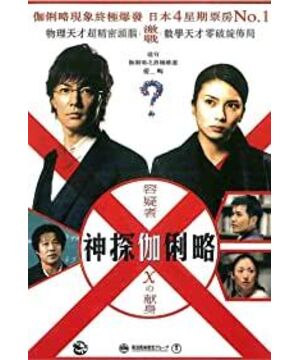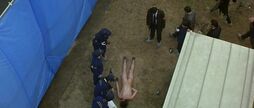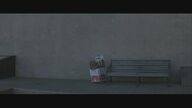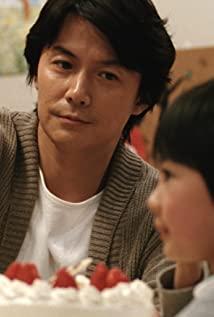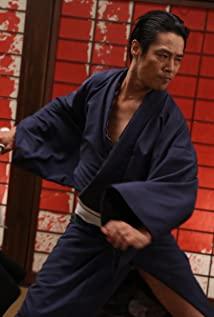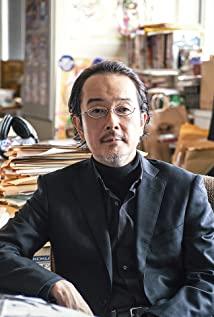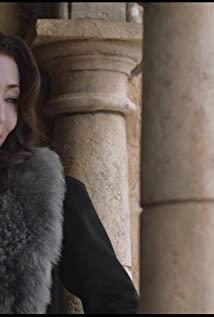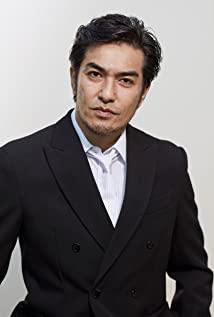——————————————————————————————
○ Digression about
reasoning "Article", the long story starts with "Murder by the Lake" (hereinafter referred to as "Lakeside"), and the film and television works start with "Detective Galileo". I don't like Japanese reasoning and film and television, works related to Higashino are exceptions.
From the very beginning, Japanese reasoning has shown characteristics that are different from those of Europe and the United States. I don't want to talk about the characteristics derived from such genres as original and denigrated. What I want to say is that, unlike European and American works that often use inheritance contention and criminal insider as the secret core of novels, Japanese works as a whole place more emphasis on love than profit. Japanese authors are more inclined to give emotional explanations to their works, and themes of love, vendetta, or heart distortion are clearly more important in Japan.
When speculative fiction has developed to this day, conventional ideas have been almost exhausted. In my opinion, European and American mystery novels have disappeared. Judging from the winning authors and works of the Edgar Allan Poe Award and other awards in recent years, European and American reasoning has actually been completely integrated into mainstream popular literature in Europe and America. The reason why their works are still called speculative novels is simply because there are police detectives (detectives) and crimes in the works, or even just a larger suspense stunt. Suspense is an essential element of almost all novels, and crimes involving crimes are already very common in modern literature, so it is impossible to see whether the category of European and American mystery novels really exists. Accompanying this phenomenon is the generalization and randomness of the definition of speculative fiction. For example, James Cain's "The Postman Always Knocks Twice", a typical black humor novel, is considered to be a classic of inference works. Dostoevsky appeared in the book list of the best inference works by a reasoning association. "Crime and Punishment", these are categories that emphasize form rather than God.
Different from European and American writers, Japanese writers are almost paranoid in the development of reasoning and go further and further away from literature, and even lose their tradition of being good at depicting the emotions of characters. They still love to write about love and hate. But these emotions have become auxiliary tools for bizarre ideas, which are essentially pretense to make bizarre plots seem more reasonable. scrutinize. Therefore, a work is equivalent to a collection of unrealistic people doing unrealistic things. Most of the works lack deep meaning and have nothing to do with literature. The accompanying phenomenon is that Japanese authors generally have average literary abilities, language machinery, and language functions only as a tool to articulate (or not articulate) the ideas they have come up with. Japanese authors only sell mysteries, not words, and rarely buy one get one free.
An exception
to Higashino Keigo Higashino is a clever exception. From the perspective of mystery novels, Dongye's novels are more suspense novels than mystery novels. He did not walk into the dead end of one-sided demands for tricks, but showed some tendency to return to tradition and consider the emotional issues of characters more realistically. His portrayal of the emotions of the characters is based on life. No matter what unbelievable situation this emotion finally pushes the plot to, this emotion is recognized by the readers. In this regard, Higashino is closer to an emotional novelist. Higashino's book is equivalent to a collection of real people doing something unusual, a kind of progress in the literary sense. The success of Dongye can give readers and other authors some useful inspirations, that is, allowing readers to participate in the work emotionally may be more impressive than intellectual participation, and may also allow readers to return to their reading interest to a certain extent.
But to be honest, Higashino's success is more or less opportunistic - he may be the best at playing with the emotions of characters in Japanese mystery novels, and he may also be the best at using reasoning elements in Japanese emotional novels. Under the circumstance that the reading vision of fans of mystery novels is increasingly closed, the freshness of Dongye's novels is self-evident. His success lies in his works wandering among various popular literatures, combining various popular elements in a balanced and natural way. He has written many masterpieces, but the masterpieces are not masterpieces, not the highest, but just masterpieces.
When I first read "Lakeside", when I read about 70% of the novel, I suddenly realized that after the opening sentence "clouds float like dirty cotton balls in the sky ahead", I may not have been for a long time. In the book, I saw Higashino using rhetoric. Whether or not to use metaphors is of course not necessarily related to the literary character of the words, but this is just to elicit a more intuitive point of view for commenting on Higashino. In addition to being stingy with rhetoric, many details can hint at Higashino's writing habits. At least when writing "The Lake", he focused most of his attention on how to conceive the plot. The language of "Lakeside" lacks tension, and the characters are basically drawn in a scribbled group portrait style. Its success mainly comes from Higashino's powerful plot concept. But when it came to "The Devotion of Suspect X" (hereinafter referred to as "X"), Higashino's techniques were much more skilled, adding more details that reflected the psychology of the characters, and it was very good to compare the intelligence of Yukawa and Ishigami and the profound scientific thoughts Together, these are proofs. It can be seen from this that Dongye is an ambitious writer, and he still has momentum.
Two "X" positioning
I will "X" in the second-rate works in the middle of the work. Second-rate here is not a derogatory term, and I have no derogatory thoughts on "X". The iceberg theory in Hemingway's "Dead in the Afternoon" holds that the author should only describe the part of the "iceberg" that emerges from the water, the words and images are the so-called "one-eighth" of the water part, and the emotions and thoughts are the so-called "" Seven-eighths" Hidden and Underwater. In fact, there are really such a batch of works, one-eighth of the part brings us a pleasant reading experience, but also contains a larger space for exploration, and those deep underwater parts make us have different gains every time we reread it. , its implication may exceed its own language generalization ability, that is, it is often said that it is difficult to express.
There are other very good works, their strength is almost all on paper, and they reach the climax and you will remember them when you finish, but you still remember what you have literally got, and there is very little aftertaste . Reasoning, suspense or emotional novels are popular novels because they are essentially novels for lazy people, or novels for people to read when they are lazy. The reader does not need to spend too much mental exploration, a popular novel The maximum value of , will be automatically presented along with the reading. Few of modern readers have the patience to spend months trying to find the deep-seated value in a thin booklet, so even if a first-class work appears in a new work, it is likely to be lost in the overwhelming publications; on the contrary, Second-rate books are more likely to be circulated and copied to become best-selling works because of the strong first reading pleasure. In fact, most of the works we read every day are second- and third-rate works or even lower. Under this positioning, "X" can actually almost represent the top level of best-selling books.
Due to the special plot setting of "X", there are some difficult points in its character creation. In fact, Dongye did not deal with these points well. The most fundamental problem is that this seemingly epic love story is just a one-way love and devotion from the man to the woman, and the two sides lack the spark of friction. Correspondingly, when the image of Shishen is greatly displayed in the works, his The "other half" Jingzi was a shadow from beginning to end. Regarding the characteristics and questions of the characters in "X", I will put them in the next two sections.
Mimiri Yasuko Kudo
Miri is one of the best characters dealt with in the novel. Although the whole novel can be said to be the duel between Ishigami and Yukawa plus Ishigami's dedication to Yasuko, in fact, many key events are promoted by Miri. It was not Jingzi who first attacked Fujian Shenji with murderous intent, but Miri. If everything was according to Jingzi's character, he begged his ex-husband to leave, give more money to perfunctory, and then find a chance to move house again, all stories no longer exists. When Yasuko and Mr. Kudo were in contact, Misato was obviously unhappy, she said, is this sorry for Mr. Ishigami? Misato actually gave her mother some sympathy when she said this. Her tone was very cold. In fact, these words were not questioning but almost accusing. In the movie the skirmish is a little more intense, but the meaning is the same. Miri doesn't speak much, but she is very thoughtful. In the end, Misato committed suicide (attempted), which means redemption. Miri's suicide incident was largely the reason for her mother's surrender. As daughters, they dared to bear their own sins. What face does a mother have for Shishen to blame herself and survive? This is different from the movie. In the movie, the main "responsibility" of Yasuko's surrender lies in Yukawa, and there is no such thing as Miri's suicide. Comparing the two, there are many reasons why Yasuko surrendered himself in the novel. Higashino doesn't pay much attention to Miri, but it is enough for a supporting role. The image of a strong, independent, daring to love and hate, and precocious little girl due to family misfortune is very good.
And what kind of person Miri's mother Yasuko is is quite vague. It can only be said that she feels a little cowardly and has no idea. We can also learn a side of her from the character's few words. At the beginning of the story, her ex-husband broke into her house and saw her daughter Miri, Fu Jian said very heartlessly: "I will make money in two or three years, and then every family will be happy to hire her." From this we can infer , Jingzi, as an escort girl, should have debuted at a young age and didn't go to school much. At the end of the story, Jingzi knelt down in front of Shishen and said, "I'm really sorry to ask you to do it for us...for a woman like me..." Obviously, Jingzi doesn't think she is a very ideal woman, not as good as her daughter. It is not a matter of character to say that she visited Shishen when she first moved here. The walls of buildings in Japan are very thin and the sound insulation effect is not good, so the Japanese who moved to a new place visited their neighbors and brought them with them. Apologizing for interruptions is customary socializing. From the beginning to the end of the story, Yasuko's behavior and mentality are passive, and when she has to choose, she chooses the most humane one. Of course, she turned herself in in the end, which is quite courageous, but in fact, this has a lot to do with Miri's suicide, as I have said before.
In the most classic love stories in literary works, the images of both men and women, especially the woman, are very plump. This may be because most of the writers are men. Whether innocently cute (as in "A Farewell to Arms") or cunning and sinister (as in "Carmen"), the vivid images of the women in these stories make their love magical. In contrast, Dongye thought too little for Yasuko, and he was able to handle it better.
Kudo Kuniaki doesn't have much role in the movie, but he still occupies a little bit of writing in the novel. He is indeed a very considerate and reliable man. It is precisely because Kudo is a good man who is more compatible with Yasuko to a certain extent, so Ishigami is more tragic. What if Kudo was just an alcoholic or an unreliable man? This is very subtle. The purpose of Shishen is to hope that Jingzi will be happy in the end. If he knew that Jingzi might marry a not-so-good man after his devotion, he would never dedicate himself like this. He would first find a way to settle Kudo, at least let him Yasushi and Kudo cut off contact. In this way, his threats to Yasuko and Kudo contain more real intentions. If this continues, the delicate relationship between the characters may be broken and out of control, and the story will not be easy to tell. So no matter what, Higashino wants to write Kudo as a good person.
But I couldn't help but look at Yasukiko and Kudo from a worldly perspective, one was a hotel waitress, the other was a man who was tired of his family going to the hotel to find a waitress for comfort, and the backgrounds were a bit unpleasant. To say that one of them happened for a reason is understandable and extenuating. To write two people as lotus flowers that are not stained with mud, one is pure and kind, and the other is honest and reliable, this condition is too strong, and it is not very close to the truth. There is also a little bit of incomprehension about
Yuchuan Shishen .
In the novel, Yukawa is a peaceful and low-key scholar, and emotional changes are not easy to capture. In the movie Yukawa has been much more emotional out of the need for drama. When Uchikai asked the truth about Yukawa, he was very sad and thought about it and said that no one will be happy if he finds out the truth (repeating Shishen's words). He has been enlightened for so long, and the final decision is to tell Yasukiko the truth. In the movie, Yukawa takes considerable "responsibility" for Yasukiko's conceit. Those who are familiar with the Tangchuan School know that he is a person who rationally suppresses emotions. He thinks about it and chooses a losing situation. This choice led to the misfortune of Ishigami, Yasuko, Miri, and Kudo, and Yukawa himself was also hit hard, and he was also a loser. There is no reason for Yukawa to do this, I think it is a sacrifice for Yukawa to pursue the ultimate tragic effect.
Shishen is naturally the best character in the work. Many of his characteristics are too obvious to discuss. Here we only discuss a very subtle psychological contradiction of the stone god - what kind of ending is the stone god looking forward to? In the novel, it is written from time to time that Ishigami is obviously competing with Yukawa. He has not encountered an opponent intellectually for a long time. He naturally has a desire to defeat his opponent Yukawa. To give just one example, the last chapter of the novel contains a psychological characterization after Shishen surrenders himself: ... No matter how accurate the reasoning of a genius physicist is, it will not be able to match the confession of the murderer. I won - Shishen thought. But perhaps out of the guilt of killing himself, Stone God doesn't quite want to win. He not only imagined the possibility of turning himself in at the very beginning of the plan, but also gave a little hint to solve the case in the contest with the police. That's what Kusanagi and Uchikai said about his own exam questions when he was questioned by Kusanagi and Uchikai - showing that what appeared to be geometry questions were actually algebra questions. In fact, this sentence really became the flash that inspired Yukawa. Shishen's characteristics are very obvious, his mind is meticulous and calm, whether it is himself or his instructions to Jingzi and his daughter, he will definitely say what is useful, and he will not say a word more when it is useless. He said such a pun like this, and he knew that it was very likely that these words would reach Yuchuan's ears. The best explanation is that he subconsciously had a little expectation for Yuchuan. There are other examples of this in Higashino's works. In a certain case, the murderer was very active like Yukawa and the others showing off an item they invented, which was actually implying that Yukawa and the police were his tools for committing crimes. The case is not disclosed. Shishen's mentality is indeed very subtle.
But Shishen also has his own problems. His problem is that of Jingzi. What is the reason why he fell in love with Jingzi. Dongye's design was that when Shishen wanted to commit suicide, he happened to be "saved" by the visiting Yasuko and his daughter. Because he wanted to die, the mother and daughter's impression of Shishen rose to the level of "saving". Dongye gave a rather ambiguous reason. He said, "Shishen suddenly felt that the beauty of this mother and daughter is essentially the same as the beauty of solving a math problem." This feeling is truly indescribable. Let's imagine that a super genius who does not seek fame and fortune, can endure loneliness, obsession and the beauty of mathematics is suddenly trapped by his loneliness and wants to commit suicide, and is moved by the beauty of the mother and daughter who meet by chance. Motivation, and I feel that the voice of the mother and daughter is simply "the highest fairy music" (original language). You can't say that this is not true, but if you look at it with the standard of a masterpiece, this reason is very thin and far-fetched. And this vital reason occupies only a small paragraph in this book. From this point of view, "X" is not as good as "Lakeside". Although the story of "Lakeside" is a bit flat, it is not as brilliant as "X", but its every step is solid, and the story of "X" is so gorgeous, so Sad and beautiful flowers have only a very shallow root, so you can't touch them.
Almost every character in Dongye has a little doubt, that is, the things that are more difficult to deal with in the story mentioned earlier. In the end, Dongye chose to blur these places. Sometimes, the ingenious setting of the plot and the fullness of the characters form a mutually restrictive relationship. Because your plot is too ingenious, it is too difficult to achieve such an ending. In order to make the characters cooperate and tacitly push the story to such a situation, you must not. Don't polish off a piece of the authenticity of each character. In terms of plot conception, Higashino took the lead, but he lost more freedom in character creation.
Film and television adaptation of Wu Dongye's novel
As far as I can see, the performances of Japanese movies and TV series are more contrived, focusing on superficial articles such as appearance, and not paying much attention to details, while the film and television works adapted from Higashino's novels are quite good in terms of standard. In "Detective Galileo", almost all the actors are very devoted, and their acting skills are also good. The relatively poor two handsome guys, Masaharu Fukuyama and Ikki Kitamura. Others have put down their bodies and threw themselves into the plot, and both of them still look like they can't let go of the idol drama mode. The Yukawa school performed by Masaharu Fukuyama was designed for children who love idols. With the signature action design of painting a series of inexplicable formulas that are relatively silent, it really doesn't look like a genius scholar, but it looks like a comparison Talented gentleman. But it must also be admitted that Masaharu Fukuyama's performance in "X" has improved.
This defect has a little magical effect in "X". Yukawa's aristocratic atmosphere contrasts with the image of a stone god who is closer to the real genius, making it more difficult for the audience to choose in their hearts. There is also the embroidered pillow Kusanagi, who really doesn't have much real talent and learns, and shows timidity when he is in front of a genius, but when our genius is enduring great pain, he still looks like an idol.
Hemingway said that first-rate movies are made from second- and third-rate novels, and that's true. The connotation of first-class novels is difficult to express in words or images. In contrast, it is much more realistic to accurately reproduce or even perfect second-class novels. It's really not difficult to make Higashino's novels, as long as you present them in a skillful film language according to Higashino's ideas, the movie won't be too bad. But the director of "X" obviously put more thought into making this movie, and the effort was very meticulous.
To give a few very small examples. After Shishen found out that Jingzi and Kudo were coming and going, he didn't say anything. After entering the house, he put away the umbrella and put it by the door. When he took off his shoes and entered the house, the umbrella fell down. This inadvertent detail keenly captured the turbulence of Shishen's mind at the moment. If this detail was written in language in the novel, it would be much more lengthy, and the traces of the axe would be more obvious. There is also a smaller one. In the letter written by Ishigami to Yasuko at the end of the story, the words in the novel are "Mr. Kudo Kuniaki seems to be an honest and reliable person", and in the movie it becomes "Mr. Kudo Kuniaki is an honest and reliable person" , why did you use the word "seems"? Because in the novel Ishigami is still not completely at ease with Kudo, and he is also jealous, and always feels that Kudo is somewhat unreliable. However, since there are still some descriptions of Kudo in the book, readers can feel that Kudo is very good. When it comes to the movie, there is no role for Kudo, and the audience is not sure what kind of person Kudo is, so they must use the always cautious Shishen's mouth to affirm Kudo's character. The difference is very subtle, but the director seems to notice. In addition, the director has a good grasp of the possible flash points in the novel, such as Shishen and Yukawa climbing a mountain, the film is stronger than the book. This plot is actually a symbol of the peak duel between two talented men. In his series of stories, Yu Chuan is an athlete who wins in any sports. The embarrassment of climbing the mountain this time shows that he really encountered an unprecedented opponent. After Shishen was imprisoned, facing the ceiling of the cell and thinking about the four-color problem, the movie is far better than the novel.
However, there is another point about the director's intentions, that is, the director seems to be aware of the weakness of the story of "X", so he makes up for it in the movie. One is to add some details to the weakness of Yasuoka's image that is not clear, such as the conflict with his daughter, etc., to give Yasukyo more opportunities to perform; the other is to add some weak points at the end for the weak reason why Shishen fell in love with Yasukiko. Details of how mother and daughter moved Shishen. Whether or not these remedies have served their purpose, the effort is commendable.
But I have to say, the ending of the movie is superfluous. This movie was supposed to stop abruptly at the place where Shishen cried, which is also the final ending of the novel "X", but the movie added a scene where Yukawa and Utsumi sat on a bench and lamented. This is nothing more than two purposes. First, the director is really not confident in the persuasiveness of Shishen's reason for dedicating his life to Jingzi, so that after the movie is over, he has to use the mouths of the two to emphasize that Shishen was saved by Jingzi. The second is that as part of a series of movies, although the male lead in the novel is Shishen, in the movie the male lead must also be our handsome Yukawa. No matter how touching Uncle Shishen is, his play is over after all, but Yuchuan's play will continue. Please continue to pay attention to the next one, that's what it means. This ending is really useless for this movie, and there is a danger of conflicting with the plot. The fact that Shishen was accidentally "saved" by Jingzi's mother and daughter is forever hidden in Shishen's heart. Even Jingzi and her daughter don't know what happened. the question?
That's why I appreciate the ending of the novel more, which I will never forget, and let it be the end of my review:
Ishigami continues howling, and Kusanagi thinks he's throwing up his soul.
View more about Suspect X reviews


